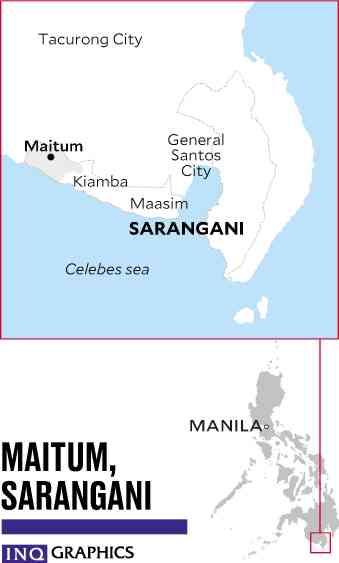Chasing waterfalls, caves in Sarangani
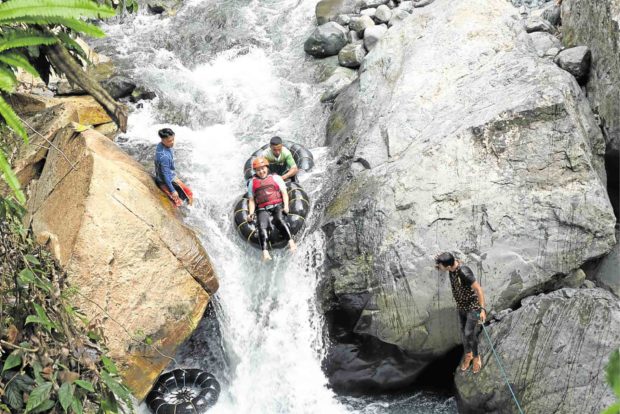
WHITEWATER FUN A tourist enjoys whitewater river tubing at Barangay New La Union, one of the attractions offered by Maitum town in Sarangani province. PHOTO BY BONG SARMIENTO
MAITUM, SARANGANI—Tuanadatu was no man’s land during the 1970s. In Maitum’s farthest village, government troops and Moro secessionist rebels fought some of their fiercest battles, forcing residents to flee their homes.
Feuding Muslim families also engaged in “rido,” or clan war, while communist rebels sought to establish a foothold in the community.
Now, with relative peace reigning in the past few years, local officials hope to bury Tuanadatu’s badland image, promoting outdoor adventures where tourists can chase waterfalls and caves.
Best-kept secrets
On Dec. 15, they unveiled their best-kept secrets—M’langen Falls, Kamlayaman Falls and Yama Cave—in Maitum’s farthest village, which lies on the border with Palimbang, Sultan Kudarat province, and Lake Sebu, South Cotabato province.
Article continues after this advertisement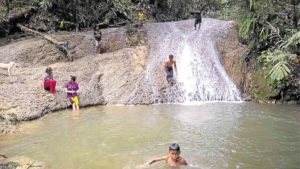
REFRESHING DIP This lagoon, where visitors can enjoy a refreshing dip, serves as headwater for M’langen Falls. PHOTO BY BONG SARMIENTO
Tuanadatu is at present a 45-minute travel on 25 kilometers of mostly paved road from the center of the quaint town. It used to take two hours due to the bad road.
Article continues after this advertisementConcreting of short patches, few and far between, are still ongoing, however.
Christians, Muslims and “lumad” (indigenous peoples) live in Tuanadatu, whose main agricultural crops are upland rice, corn, abaca and coffee.
“What you can see in our town, you can’t see in other places. What you can see in different places, you can see in our town,” Mayor Alexander Bryan Reganit, who led the opening of the new tourism destination, told the Inquirer.
He was referring to the whitewater tubing adventure at Barangay New La Union, the archeological finds in a cave at Barangay Pinol, and the sea turtle, or “pawikan,” hatchery at Barangay Kiambing.
New leaf for village
“These new tourists spots will pave the way for residents to have better lives with the economic activities that tourism can spur,” Reganit said. Their opening, he said, turned a new leaf for the village with the expected influx of tourists.
Each spot is accessible by a “habal-habal” (motorcycle) ride. It takes a short trek to reach these areas from the motorcycle drop-off point.
From Maitum poblacion (town center) to Tuanadatu, a motorcycle ride costs P100 per person. Within the community, the fare is P20 per person.
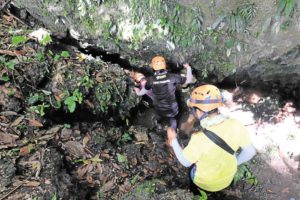
EXPLORING YAMA The narrow entrance to Yama Cave is not for the fainthearted. PHOTO BY BONG SARMIENTO
From the village proper, locals suggest to visit Yama Cave first and be awed by its stalagmites and stalactites, and a creek. Crawling is required at some points to reach the inner chamber.
Guide fee is P400 for not more than 10 tourists and P1,500 for up to 25 people.
At M’langen Falls or Kamlayaman Falls, take a refreshing dip in their lagoons and enjoy a picnic. Tourists are advised to bring enough food and drinks since the tourist spots do not have canteens yet.
Espaldon Tuanadatu, the village chair, said three more waterfalls or caves were being explored so these could be offered to the public.
Tourism circuit
“Our dream to become part of the town’s tourist destination is now taking shape. It’s as if we’re in heaven,” he said.
Arlex Narte, Maitum tourism officer, said Tuanadatu’s natural wonders could be part of the town’s tourism circuit.
Recognized as a cradle of civilization, Maitum is home to the unique 2,000-year-old anthropomorphic jars, an archaeological find unparalleled throughout Southeast Asia. These artifacts were used for burial during the Metal Age in the Philippines from 5 B.C. to A.D. 225.
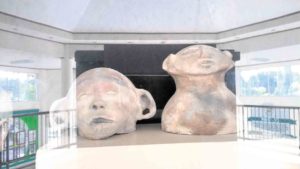
ARTIFACTS Replicas of ancient jars found in Maitum are on display at the town hall. PHOTO BY BONG SARMIENTO
The original jars are kept at the National Museum. Replicas are displayed at the town hall.
In New La Union, tourists can experience whitewater river tubing along the Pangi River, one of the country’s cleanest waterways, over a distance of 4 km and for a few hundred pesos. The eco park pioneered the outdoor adventure in 2005.
Digs Movilla, a resort manager, said the ride on a “salbabida,” or inflated tire tube, would traverse breathtaking drops and pass through river boulders.
On the shore of Kiambing, which faces the Celebes Sea, visitors learn about sea turtle conservation or they can choose to swim.
For now, Maitum can accommodate only 200 visitors at one time in its inns and homestays, Narte said.
“We are fixing our tourism code and we are looking to offer a package that would connect all our tourism destinations in one visit,” he said.
